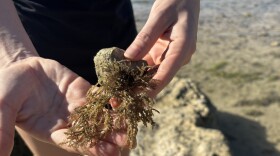The focus recently has been on the possible impact of avian flu on our native birds. But what about the risks for our marine mammals, in particular native Hawaiian monk seals?
Across the globe, there have been die-offs due to avian influenza. Up until last month, Hawaiʻi was the last state to be free from avian flu.
Michelle Barbieri, who leads the National Oceanic and Atmospheric Administration's Hawaiian Monk Seal Research Program, has been part of efforts to monitor our endangered monk seals for signs of avian flu.
Barbieri said as of right now the disease has not been detected in any monk seals.
"I think on the whole we've got evidence that it reached Hawaiʻi, and we're kind of in that period of time where we're going to be paying very careful attention to see which direction this goes and where it takes us, and meanwhile, using this time to be as prepared as we can," she said.
She added that the habits of monk seals reduce the worry of a possible spread.
"Because Hawaiian Monk Seals tend to be a lot more spread out and can reproduce throughout the year, we don't have those big aggregations. So that's definitely something that's kind of built into the species — probably going to be protective. It's probably not necessarily going to be absolutely protective, but it is definitely a good thing," she said.
At the moment, the organization does not have a vaccine to protect monk seals from avian flu. However, Barbieri said they are looking into it.
"There has been a program that is really admirable to protect the California condor with vaccination, and that's in a specific geographic region, but we're looking really closely at that as well. So we've at least got a tried and true way that we know we can give monk seals vaccines, and we have a process now for figuring out how to do that," she said.
If a monk seal is spotted, the public is asked to report the sighting to 1-888-256-9840.
This interview aired on The Conversation on Dec. 12, 2024. The Conversation airs weekdays at 11 a.m. on HPR-1.





